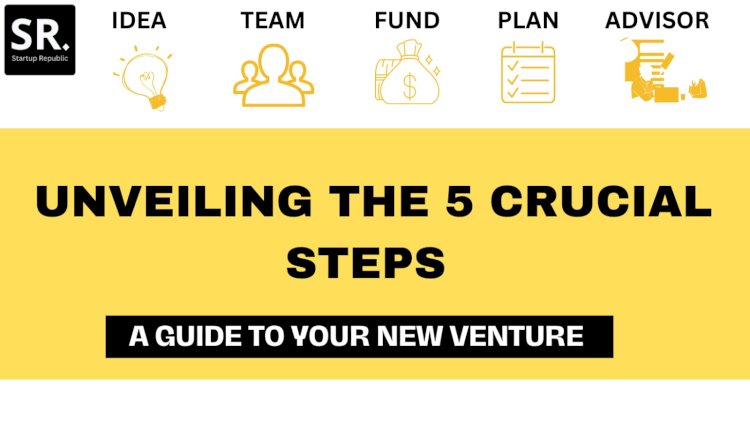How to Catapult Your Startup to Success: Unveiling the 5 Crucial Steps
Embarking on the thrilling journey of a startup demands more than just a revolutionary idea. It requires meticulous planning, a resilient team, financial foresight, a well-crafted business plan, and the guiding hand of mentors and advisors. In this blog, we'll navigate through the crucial steps that can transform your entrepreneurial vision into a successful reality. From validating your idea to assembling the right team, securing funding, crafting a comprehensive business plan, and enlisting mentors and advisors, each step plays a pivotal role in the startup saga. Join me as we unravel the intricacies of this entrepreneurial roadmap and delve into the essentials that can pave the way for the next big success story.

These are the ‘5 Steps To A Startup’ which I am sharing with you.
1. Product Idea and Validation
The idea is the key element of any startup, its true that ideas are dime a dozen, and what matters most is execution. But the seed of the venture is that thought that came into your mind with a flash and you say to your self, that you want to do it.
But the other important aspect is the Validation of the Idea. Two broad things you should take care of
Is my idea Unique, avoid a ‘Me Too’ idea
Does it solve a Customer Pain Problem.
If you are able to solve a customer problem which is unique, then you will surely have a buyer who is willing to pay for it. In our day to day life we will come across such challenges or issues which the customers are facing and would love to have a solution for it. Take that idea and start to build around it, go into the very details of the idea and how you would go about executing it. Do the market research and check the competition, there is no such thing as no competition, there will always be some form of competition out there.
2. Founding Team
Establishing a robust founding team is paramount for the prosperity of your venture. While embarking on a solo entrepreneurial journey is conceivable, the collaborative strength of a team significantly elevates your chances of success. Investors are more inclined to back ventures with a cohesive team, showcasing diverse skills and a shared belief in the idea.
When it comes to team size, targeting a range of 2 to 3 founders is generally considered optimal to circumvent unnecessary chaos. The quintessential founding team typically embodies three pivotal roles: the Visionary, the Technologist, and the Creative Maven.
The Visionary assumes the role of the CEO, steering the ship with a keen eye on business strategy, team building, sales, marketing, partnerships, and overall financial acumen. They are the dreamer capable of articulating future visions and making tough decisions.
The Technologist, often occupying the CTO position, is the tech virtuoso responsible for developing the product, crafting intellectual property, and laying the technological foundation crucial for the venture's success.
The Creative Maven, or the Hipster, takes charge of product design, ensuring a captivating user experience, and building a distinctive brand identity. Their focus on aesthetics and market appeal adds the essential "wow" factor to the product.
In reflecting on this dynamic trio, consider Steve Jobs as a prime example of a visionary who adeptly embraced these roles. Together, these components forge a well-rounded team poised to navigate the intricate landscape of entrepreneurship and heighten the prospects of success.
3. Funding
One of the most critical aspects of any venture is money ie funding. There are couple of financials you need to worry about
· Personal funding
· Company Funding
Personal Funding
If you are a single and bachelor then you could probably survive on your parents money. But if you have a family with kids and liabilities, then financial planning is very important. For the first year your venture probably wont return much money which you could take home, most of the money will keep getting ploughed back into the venture. So plan for this scenario, The minimum advisable is to have 12 months of personal funding to run the house and all liabilities, best case is 24 months. Anything less than 12 months will be inviting trouble, you don’t want to remove your focus from the venture you plan to build.
Company Funding
There are few ways to get the funds to start your venture, you should plan for 12 months or more, of finance to run the company, this will be mostly for salaries and other misc items. Don’t count founders salary in this
· Self funding, most likely from your savings
· Accelerators / Incubators
· Loans, if you are lucky
· Friends and Families, again if you are lucky
Raising funds from Friends and families is right down in my list, personally I would avoid this route. You could end up breaking your relationships with them forever or create unnecessary tensions of things dont go well in the venture.
Loans depends upon different countries, but generally are hard to get unless you have any collateral to provide. Dont ask for your dads house
Accelerators and Incubators are a good way to get some seed funding, they will also provide you space and all guidance you will need to grow your venture. But getting into them is a tough challenge as there are many other startups who are competing for them.
If nothing works, then self financing is the only option you will have left. Hard truth but it’s the truth with which you need to live.
If you are not very deep pocketed, like many of us are, then ensure you have the plans to raise funds to grow your venture. There are very few ventures who have totally survived on the founders funds when doing their startup.
4. Business plan
Ensure you have done this document, its important to write things down. Many entrepreneurs I know, don’t believe in documentation and believe that they have it all in their heads. But the reality is when you start to pen your thoughts down, that’s when you will also self validate your own idea. That’s when you have to answer the tough questions. A typical business plan consists of the following elements:
· Executive summary
· Company description
· Market research
· Description of products and/or services
· Management and operational structure
· Marketing and sales strategy
· Financials
I want to highlight important point, ie the Exit Strategy, it is an entrepreneur’s strategic plan to sell his or her ownership in the company to an investor, another company, IPO or even shutting down. If the business is successful, then it’s a good way to make substantial profits. If the business is not successful, then the exit strategy will help you limit your losses. Ensure you plan your stop loss and get out at the right time, don’t keep stretching. Stick to your word.
5. Mentors or Advisors
Yes you need these guys on your side if you really want your startup to succeed. Although mentors and advisors are commonly mentioned in the same breath, we can differentiate between the two:
Mentors are typically close friends who will help you grow as an individual, rather than financially. Their generally older I age and using their wisdom will guide you in both personal and business matters. They are generally not on your payroll.
Advisors on the other hand are professional whose main goal is to help grow the company rather than you as an individual. They are experts who will provide insights and assistance in specific business areas. They will be on your payroll. So plan to have an advisory board, with people who are experts in their fields who will help you grow. Having a board will help increase the success of your venture, either you get them on day zero or may be 6 months down the line, important thing is that you plan for this in the beginning and start finding the key people who you would like to be part of your board.
Best of luck for your idea and hope you build the next successful Unicorn
























